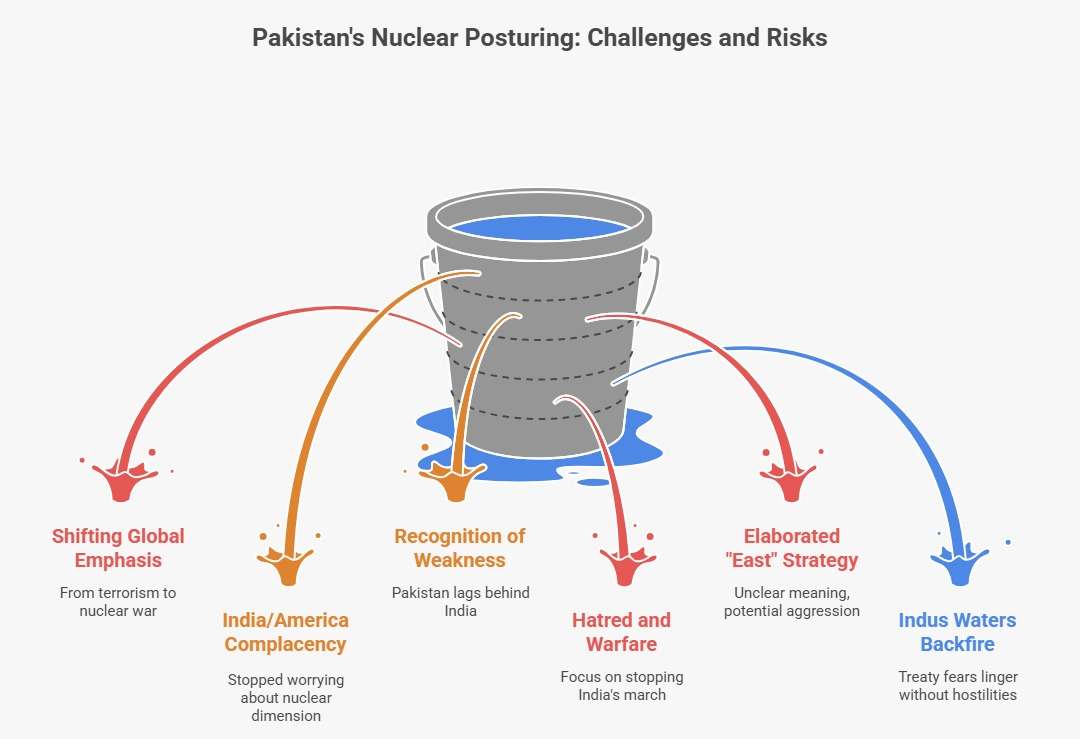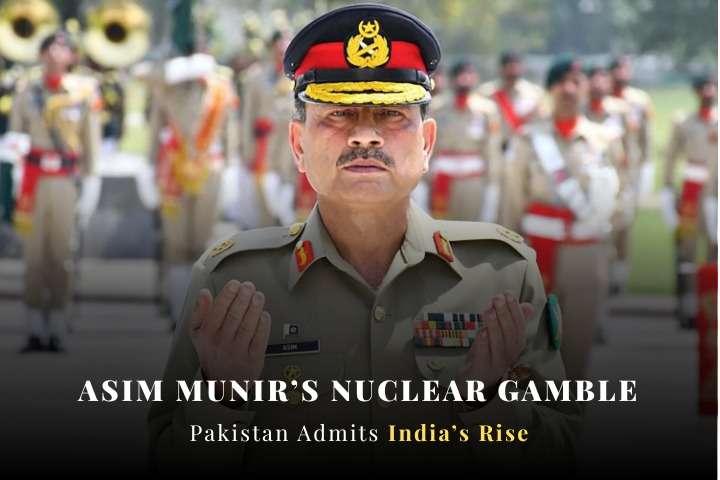A speech was delivered by Field Marshal Asim Munir, Chief of Army Staff, in Tampa, Florida, at a formal dinner for overseas Pakistanis. Munir’s speech has generated scrutiny against Munir’s statement – especially what some have been calling dangerous nuclear brag. This analysis suggests that historical context is crucial, given that Pakistani military dictators have often been criticized for a lack of strategic intelligence, political discretion or long-term vision, frequently resorting to “small tactics for big strategy” that lead to self-destruction and harm to the nation.
The analysis draws a direct link between Munir and four previous Pakistani military leaders:
- Muhammad Ayub Khan, who launched and lost the 1965 war and alienated America for five years;
- Yahya Khan, who oversaw the loss of more than half of Pakistan’s territory in 1971, resulting in the creation of Bangladesh;
- Zia-ul-Haq, who diminished Pakistan by transforming it into a “University of Jihad”; and
- Pervez Musharraf, who damaged Pakistan’s economy and globally cemented its image as a state sponsor of terrorism.
Asim Munir is positioned as the “fifth” in this line, with rhetoric described as “more alarming than his infamous predecessors,” none of whom resorted to such language even in defeat. Despite this, Munir appears willing to “go for broke even if it risks taking his country and half the world down with it”.
Munir’s recent statements reveal several key aspects of his strategic position and thinking. He is evidently attempting to resurrect Pakistan’s ‘nuclear blackmail’ capability, which the source indicates “had disappeared after Operation sindoor” and his military stance under him was undermined in the post Uri surgical strikes and further weakened by Balakot airstrikes in 2019. From his perspective, losing this nuclear leverage restricts his options in Kashmir.
Unlike India, which publicly adheres to a “No First Use (NFU)” principle, Pakistan has no such commitment. Pakistan’s clearest articulation of its nuclear threshold was provided in 2002 by then-Director General of Strategic Plans Divisions (SPD) Lt. Gen. Khalid Kidwai during Operation Parakram. He identified four triggers for nuclear use:
- Substantial loss of Pakistani territory;
- Substantial loss or degradation to Pakistani forces, particularly air power;
- Economic strangulation or blockade posing a threat to Pakistan’s existence; and,
- Mass internal subversion or destabilization.
In his previous mouthpieces, this doctrine views nuclear weapons merely as a loser’s option in a conventional context when making a conventional loss; however, Munir recently stated “don’t count on us being rational,” suggesting he does not expect Pakistan to act rationally in a nuclear use situation. 
Furthermore, Munir aims to shift global emphasis to nuclear war. He is reminding India and the world of Pakistan’s destructive capabilities and its potential willingness to unleash them, irrespective of the consequences. This is an attempt to redirect global concern in the subcontinent from cross-border terrorism to the “fear of nuclear war”.
Historically, Pakistan has been the sole party to issue nuclear threats during India-Pakistan crises, including
- Q. Khan’s “If you drive us to the wall...” remark in 1987,
- The “Resort to any weapon” threat during the 1999 Kargil War, and
- Pakistan’s First-Use Option during Operation Parakram in 2001–2002.
Munir appears concerned that India and America have “stopped worrying about the nuclear dimension”. He is thus “Holding a grenade with the pin pulled, daring others to move” in a manner often seen from Pakistanis, attempting to revert to the atmosphere of summer 1990. During that period, Pakistan threatened the V.P. Singh government with initiating a war via a nuclear strike, a message conveyed by Robert Gates (then US Deputy National Security Adviser) and later by Pakistani Foreign Minister Sahibzada Yakub Khan to India’s External Affairs Minister Inder Kumar Gujral. Munir’s recent statements signal a return to “preemptive deterrence”—the concept of using nukes “anytime,” essentially a return to nuclear blackmail.
Munir also demonstrates a recognition of Pakistan’s lost position, acknowledging that Pakistan has fallen significantly behind India. He employs a “crude analogy,” describing India as “a shining Mercedes that is driving like a Ferrari” and Pakistan as “a dump truck full of gravel”. He asks Indians rhetorically that if the dump truck, plowing into the Mercedes, “don’t you know you Indians you will lose more.” The source makes clear the sweltering hatred Munir has and that it is psychological warfare, and refers to a Pakistani tweet that referenced the scripture that mentions Allah sending birds dropping stones on enemy elephants, that were war elephants which burnt down “like straw,” along with a picture of Mukesh Ambani. This was interpreted as psychological warfare.
The source notes a stark reversal of fortunes: four decades ago, Pakistan was economically and industrially “way ahead of India,” a reality now hard to believe. Munir, currently far behind India, sees no solution to reverse Pakistan’s decline and focuses only on “stopping India’s march”.
Regarding military strategy, Munir has further elaborated on his DG ISPR’s boast to The Economist, stating that in the next conflict, Pakistan will “begin with the east on from India’s eastern side”. While some in India speculated about a collusive attack with Bangladesh, the source deems this unlikely. Munir’s qualification that they retain their “most valuable assets” in the East suggests he is not referring to economic assets; the true meaning is unclear to the public but potentially clear to “smart people in the establishment”.
Munir also admitted that the “Pelga move stuck back,” implying that the fear over the Indus Waters Treaty will persist even without hostilities. He attempts to appease his base by threatening to “fire 10 missiles” and destroy any dam India builds on the Indus system. The source notes that Munir is aware “no dam can be built overnight or in his time,” making this a safe boast for now.
Additionally, Munir reiterates claims first made in his April 16th speech, asserting that Pakistan is the only state founded on the Islamic Kalma after the Holy Prophet’s Medina, and thus, the existence of “massive minerals under Pakistan’s soil is pre-ordained”. This is described as “snake oil,” which he also “sold” to Donald Trump. The source suspects Trump merely used Munir and Pakistan to “troll India and to put India under pressure”. Of immediate importance to Munir is signaling absolute boss status to his own population.
Despite not having formally taken over the presidency, this does not diminish his power or rule out him doing so in the future. The historical model in Pakistan has often been a “uniform with the presidency,” which could be a significant temptation for him. Finally, despite his bravado, Munir exhibits insecurity. In Pakistan, an army chief’s insecurity is not merely about losing a job but a more serious matter than simply handing over power and retiring. The world and even Pakistani audiences have seen images of damaged Pakistani air bases, while Pakistan has failed to produce any images of Indian targets. The source suggests that “an exaggeratedly puffed up bully is often a recent loser.”
The ultimate lesson drawn from this analysis for India is to be alive to not just the possibility but the likelihood that he will be at our throats again. History, as the source concludes, demonstrates that every Pakistani war launched against India has been the result of one intellectually challenged man’s miscalculation.

